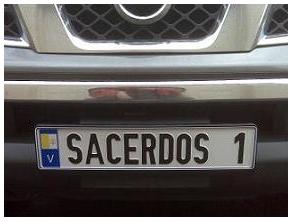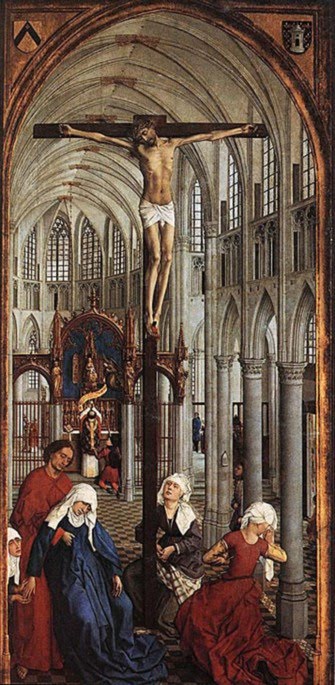What is it about this time of year, right after the holidays? It seems that there are always more deaths than usual. I suppose it is a testament to the will to live, since so many people focus on getting through the holidays that once they are over they start going. We lost two in our family this week, both great aunts of mine. The last two sisters of eleven siblings (my maternal grandfather being one of that eleven). Today was the funeral of my Aunt Dolores, tomorrow of my other aunt: Sr. Vera, OSU. Sr. Vera was an Ursuline sister, professed 68 years. I preached at the funeral Mass today; I will celebrate and preach tomorrow. They had a nice photograph of Sr. Vera from her profession day (1941) over at the motherhouse where visitation took place this afternoon:

My homily:
What an honor it is for me to be here this morning to celebrate the funeral Mass of someone who has been such a big part of my family. Sr. Vera was a beloved aunt to many of us here, a model of faith put into practice. As a family member who was called to a religious vocation, I count it a blessing that she was able to have been involved in a special way at my Ordination Mass eight and a half years ago, and that I was able to celebrate a special Mass for her 60th anniversary of profession not long after. On behalf of all of my family I want to offer our gratitude to the sisters - all of you here - who were such a big part of Sr. Vera’s life for these many years, and to thank as well Fr. Merkt, who is joining me in celebrating this funeral Mass.
Sr. Vera was a part of two families: the Gardner family, and the family of the Ursuline Sisters. Each of these families was an important part of her life, and ultimately it had been God who placed her in them both. Just yesterday we celebrated the funeral for her beloved younger sister Dolores, who went to her reward just a few days before Sr. Vera.
Now I just preached Aunt Dolores’ funeral Mass yesterday, and I know that all my family here is anxious to see if they recognize this homily…! Well, as I reflected on this, the thought occurred to me that indeed, Aunt Dolores and Sr. Vera were similar in many ways. They both, it strikes me, shared a similarly strong faith. While Aunt Dolores heard God’s call in the form of married life, and found His hand guiding her in raising her children and devotedly caring for her husband, Sr. Vera heard God’s voice calling her to religious consecration with the Ursulines. However different their vocations in life may have been, I think that perhaps we could all recognize the identical goodness that was in both of these two sisters' hearts. In many ways they were inseparable in life; they proved to be inseparable as well in death. May they both be joined with our Lord today!
Many of you know that I am currently assigned to the Catholic University of America in Washington, DC where I am studying Canon Law. Well in Book II of the Code of Canon Law, there is a special section that treats the consecrated religious life, which Sr. Vera had lived for these past 68 years. The very first canon of that section is what is called a “theological canon.” Like many of the various sections of the Code, it lays out for us the theological ideal of the particular part of the Church’s life that that section deals with. In this canon - canon 573 - we find a description of consecrated life in the Church. It reads:
"The life consecrated through the profession of the evangelical counsels is a stable form of living by which the faithful, following Christ more closely under the action of the Holy Spirit, are totally dedicated to God who is loved most of all, so that, having been dedicated by a new and special title to His honor, to the building up of the Church, and to the salvation of the world, they strive for the perfection of charity in the service of the kingdom of God and, having been made an outstanding sign in the Church, foretell the heavenly glory." Prompted by the Holy Spirit, the life of one who is consecrated to God through religious profession is meant to be a special sign and symbol of the life of heaven. Such a person is “totally dedicated to God, who is loved most of all,” the canon states.
For me, there are no better words to sum-up what Sr. Vera has meant to me and my family. In the way in which she has led her life - uniquely dedicated to God - she has put this ideal into practice. She has been for us a steady reminder of God’s presence throughout all of our lives. In all of the ministries she exercised: as a school teacher here in Louisville, Evansville, Pittsburg, Mississippi, and South Carolina. In her ministry as an advocate for foster children and children of the imprisoned. In all of these various ministries and assignments, she showed forth to us an undivided dedication to God, whose presence she recognized in the ones she served. She indeed “strove for the perfection of charity in the service of the kingdom of God.”
In the piety of an earlier time we used to hear it said often that a religious sister was a “bride of Christ.” While this particular metaphor may have its limitations, it does serve as a reminder of the closeness of the relationship that one who is a professed religious is called to have with God. The motto of the Ursulines: “Soli Deo Gloria,” is also a good summation of this. To “glorify God alone,” through every act of one’s life, was the shaping force to Sr. Vera. It is also the aim of the beatific vision, which - we all pray - she now contemplates.
So today, as we gather to commend her soul to God - the just yet merciful judge of us all - we place firmly in our hearts the model of faith that Sr. Vera showed to us. She was a powerful image of faith which shaped our entire family. We pray that we might continue to benefit from her memory.
Dear God, you gave us a powerful witness of your love in the life of this woman. Forgive the sins she committed through human weakness and gather her to yourself. Help us who remain to continue to be inspired by her life, and now that she is gone from us, to comfort one another with the assurance of our faith. May you alone be glorified - “soli Deo gloria!”























